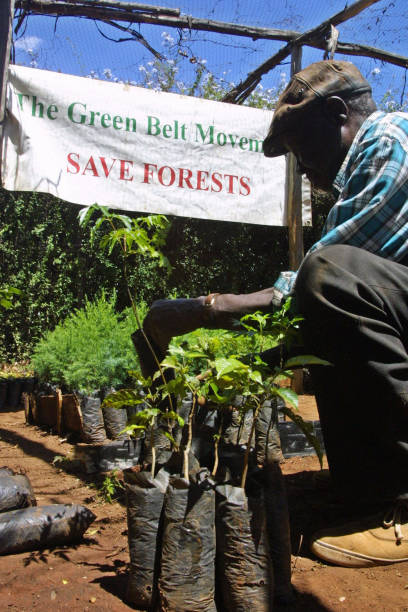As COP26 negotiations are underway, African ministers have challenged funders to provide USD 2 billion toward the AFR100 initiative by the next COP, while the first 20 restoration groups to receive funding from AFR100 have been announced. Soon afterwards Jeff Bezos, the found of Amazon, reportedly pledged USD 2 billion for land restoration in Africa through the Bezos Earth Fund.
Jeanne d’Arc Mujawamariya, Minister of Environment for Rwanda, Nancy Tembo, Minister of Forestry and Natural Resources for Malawi, and Mohammad Abubakar, Minister of Agriculture and Rural Development for Nigeria issued the funding challenge last Tuesday at the global climate conference taking place in Glasgow.
Funding groups, including the African Development Bank, German government, Bezos Earth Fund and Global Environment Facility responded by announcing their plan to invest in land restoration by 2026 and calling on other groups to contribute to this investment goal.
Bezos in Glasgow described his trip to space in July as an eye-opener on the fragility of life on Earth: “I was told that seeing the Earth from space changes the lens from which you view the world but I was not prepared for just how much that would be true,” he said. In total, the Bezos Earth Fund plans to invest USD 10 billion to fight climate change.
“Africa is home to the world’s greatest restoration opportunity, with 700 million hectares of degraded land that can be restored. Africa is the continent most dependent on the land for livelihoods, and most vulnerable to climate change. Africa must therefore lead the way,” said Ibrahim Mayaki, CEO of the African Union Development Agency (AUDA-NEPAD). “We warmly welcome partnership with ambitious funders like the Bezos Earth Fund.”
Although most African countries have historically contributed little to climate change, they are among the most affected. Climate change is already causing weather disasters on the continent, such as recurrent flooding in South Sudan and drought in Madagascar. The Sahel region is continuing to become desert, and local communities could stand to lose USD 4.6 trillion from cereal crop losses alone by 2030.
In a press release, AFR100 stated that the first USD 2 billion investment in local African organizations, businesses and government-led projects could later initiate an investment of USD 15 billion, which could spark the restoration of 20 million hectares of land by 2026. This in turn could generate USD 135 billion in benefits to around 40 million people.
“Local communities own and manage nearly 70 percent of Africa’s land. That is why a future where rural Africa’s landscapes are fully restored is only possible if we believe in and fund the work of thousands of community groups and leaders, especially young people, women and entrepreneurs,” said Wanjira Mathai, vice president and regional director for Africa at the World Resources Institute (WRI) and a Friend of COP26.

The first funding winners
Meanwhile, the first 20 African restoration-focused organizations and businesses have been selected for AFR100 funding, the first concrete investment in the second phase of the AFR100 initiative. Each will receive USD 50,000-500,000 in the form of loans or grants. Eighty more organizations will be invited to the cohort on a rolling basis.
Funders including Bezos Earth Fund, One Tree Planted, Good Energies Foundation and DOEN Foundation have announced their investment in these restoration groups. Other partners will also independently monitor each project using satellite monitoring and field verification techniques with support from the Land & Carbon Lab initiative of the World Resources Institute.
These are the first awardees:
Action Communautaire pour le Développement Intégral du Congo et Grands-Lacs
Albertine Rift Conservation Society (ARCOS)
Climate Change Africa Opportunities (CCAO)
Durrell Wildlife Conservation Trust
Environmental Conservation Trust of Uganda (ECOTRUST)
Exotic EPZ Ltd
Institute of Green Growth Solutions (IGGS)
International Tree Foundation
LEAD Foundation
Mount Kenya Environmental Conservation
Mouvement Alliance Paysanne du Togo
North Route Nursery Ltd
PADO Investments Limited
Plant with Purpose
Powerstove Offgrid Electricity Limited
Nature and Biodiversity Conservation Union
Tilaa Ltd
Wells for Zoë
World Agroforestry Centre (ICRAF)
Youth Action for Relentless Development Organization Sierra Leone (YARDO-SL)
Read original story on Global Landscapes Forum

